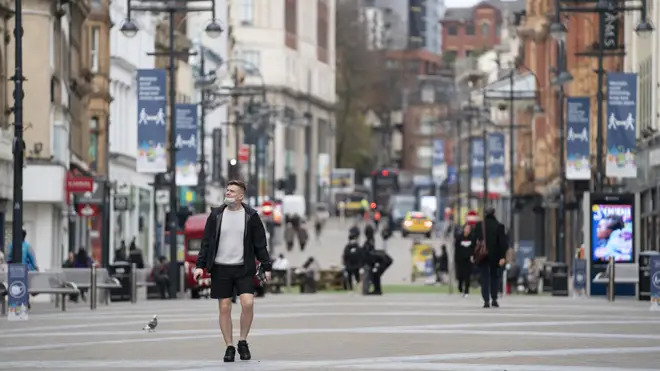
Paul Brand 10am - 12pm
6 November 2020, 13:00

The rate of coronavirus infections across England and Wales is beginning to show signs of levelling off, new data suggests.
The Office for National Statistics (ONS) said an estimated 618,700 people in England - one in 90 - had Covid-19 between October 25 and 31, up from 568,100 the week before.
But while the infection rate has increased in recent weeks, "the rate of increase is less steep compared with previous weeks", the ONS said.
Ruth Studley, head of analysis for the Covid-19 infection survey, said: "At a national level we are seeing infections slow across England and Wales but they are still increasing.
Read more: 104 arrests during anti-lockdown protest in London
"Within England, every region apart from the North East has shown increased levels of infection.
"The level of infection in young adults and older teenagers appears to have levelled off recently.
"However, they continue to be the most likely to be infected despite increases in all other age groups."

Gym owner explains to LBC why he is refusing to close during lockdown
When looking at new daily infections, the ONS said the rate across England appears to have "stabilised".
There were an average of 45,700 new cases per day of Covid-19 in private homes between October 25 and 31, down from an estimated 51,900 new cases per day for the period from October 17 to 23.
This suggests the rate of new infections "appears to have stabilised in recent weeks at around 50,000 new infections per day", the ONS said.
The figures do not include people staying in hospitals or care homes and are based on more than 689,000 swab tests gathered from across the UK in people with and without symptoms.
In other developments:
- England's biggest hospital trust said its largest hospital has been forced to postpone all planned procedures due to a "significant" rise in very sick patients. The University Hospitals Birmingham NHS Foundation Trust (UHB) said the Queen Elizabeth Hospital had seen a sharp rise in Covid-19 and non-Covid-19 emergency cases.
- Denmark has been taken off the UK's coronavirus travel corridor list, meaning anyone arriving in the UK from Friday will need to self-isolate for 14 days.
- City-wide mass testing has got under way in Liverpool in the first pilot study of its kind. Everyone living or working in Liverpool - including children - will be offered repeat tests, whether or not they have symptoms.
Tim Spector, professor of genetic epidemiology at King's, said daily cases were falling in the north of England and Scotland, and cases overall were moving in the "right direction".
He said they were a "positive sign that we have passed the peak of this second wave", adding: "We urge everyone to respect the restrictions and help get the number of cases down as soon as possible to help the NHS, end the lockdown and get us in good shape for December."
Data shows the system reached just 59.9% of close contacts of people who tested positive for coronavirus in the week ending October 28.
On Thursday, Boris Johnson insisted that four weeks of national lockdown should be enough to drive down the spread of coronavirus so severe restrictions can be eased.
As England was plunged into a second shutdown, the Prime Minister acknowledged many people were "anxious, weary and fed up" but continued to express optimism that science would succeed in finding a way out of the crisis."